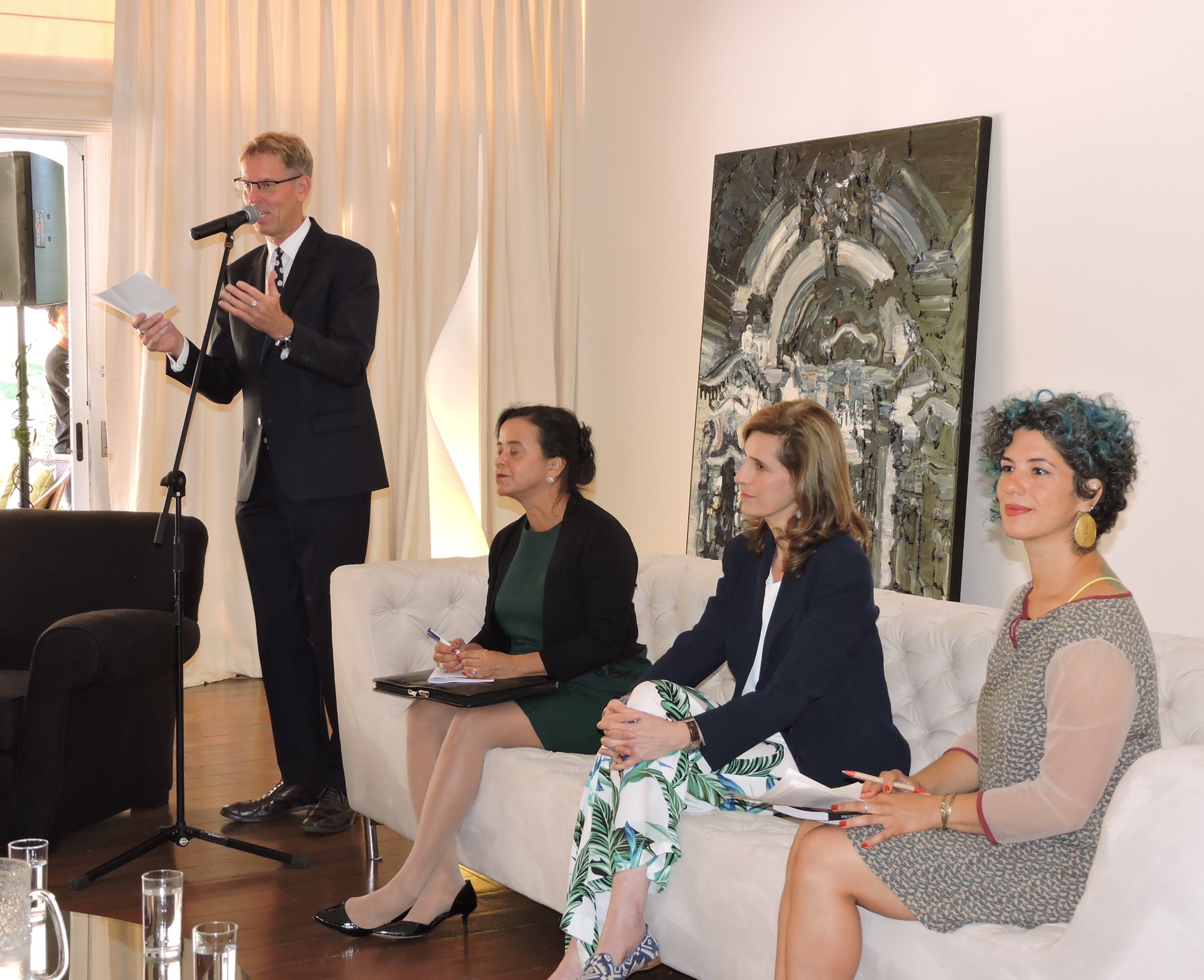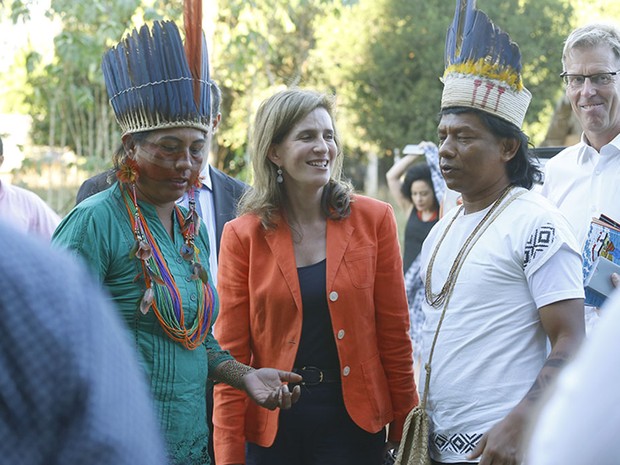[:pb]Oda Paula Fernandes
The Belgian Embassy in Brasilia opened its doors again, this Wednesday 6, to receive the public present for the releasing of the book “Femmes Prix Nobel de la Paix” (Women Nobel Peace Prize) and participating on an informal debate about the subject with the author, the princess Marie-Esméralda Adelaida Liliana Ana Leopoldina, who is also journalist and writer.

The informal debate addressed the history and relevance of ten of the 16 women awarded with the Nobel Peace Prize in a hundred years of awards. According to the author, it is a very small number of women awarded. “We still have few capable and strong women winning in the world”, lamented the princess. “And it is a shame that the award is very close to death”, added Maria Leticia Barbosa, representative of Women Nordestinas, mentioning the need to take into account the work done away from war zones and political conflicts, especially for and by women. Other issues were addressed, such as people’s rights, woman’s rights, environment preservation and conservation, human rights, and other religious and humanitarian issues.

The Maria da Penha Law was cited as an example of achievement by the need of the women to break free from domestic tyranny exercised by male power and whose inspiration, Mrs. Maria da Penha, have competed for the Noble Prize. She was 30 when she was attacked by her then-husband for the first time. She remained silent, for feeling shame and not knowing where to go. She found out, eight years later, that the husband himself had been the author of the shot that she took in the head while she slept and that left her paraplegic. Since then, the pharmacist Maria da Penha, born in Ceará, northwest region of Brazil, was engaged in a fight that have resulted in the creation of the law that bears her name and which protects women from domestic violence.
The income collected through the book sales was intended to the Garatuja project, from the Association Assistance, Culture and Human Education. The project operates in the region of São Sebastião and serves seventy girls, from 9 to 18 years old. Formed by students of the Belgian teacher of classical ballet and contemporary dance Dorka Hepp. The group performed for the Princess of Belgium and for the collaborator of the government of Brasilia, Marcia Rollemberg.
“Dancing is a way to improve confidence and also communication. It is very important to have projects like this”, said the princess after watching the performance. “This is a work that develops artistic and cultural education for the population”, concluded the first lady of the Federal District.
Princesa lança livro sobre mulheres premiadas com o Nobel da Paz
A Embaixada da Bélgica em Brasília abriu mais uma vez as portas, na última quarta-feira, dia 6, para receber o público que estava presente para prestigiar o lançamento do livro “Femmes Prix Nobel de La Paix” (Mulheres Prêmio Nobel da Paz) e participar de um debate informal sobre o assunto com a autora, a princesa Maria-Esmeralda Adelaida Liliana Ana Leopoldina, também jornalista e escritora.
Com a presença de representantes do Clube Internacional de Brasília, do Centro Feminista de Estudos (CFemea), do Grupo dos Cônjuges de Chefes de Missão (GCCM), do Clube Soroptimist, de alguns professores da Universidade de Brasília (UnB), de representantes de organismos internacionais, além da primeira-dama do DF Márcia Rollemberg, o debate fechou a agenda de eventos oficiais da princesa Maria-Esmeralda no Brasil.
O debate informal abordou a história e relevância de dez das 16 mulheres premiadas com o Prêmio Nobel da Paz, em cem anos de premiação. O que representa um número muito pequeno de mulheres premiadas, segundo a visão da autora. “Ainda temos poucas mulheres capacitadas e fortes premiadas no mundo”, lamentou a princesa. “E é uma pena que o prêmio esteja muito perto da morte”, completou Maria Letícia Barbosa, representante das Mulheres Nordestinas, ao mencionar a necessidade de se levar em conta para a premiação os trabalhos realizados longe das zonas de guerra e conflitos políticos, em especial por mulheres. Outras questões foram abordadas, como o direito das gentes, da mulher, a preservação e conservação do meio ambiente, os direitos humanos, além de questões religiosas e humanitárias.
Após o debate, a princesa participou de uma tarde de autógrafos no pátio da residência oficial do embaixador da Bélgica no Brasil, Jozef Smets. Regados a bom vinho, canapés e risadas, os convidados puderam expor projetos desenvolvidos no Brasil em favor da sustentabilidade, igualdade racial e direitos humanos. Além de levar pedidos de que na Bélgica se tenha mais mulheres à frente de projetos importantes dentro da igreja católica.
A Lei Maria da Penha foi citada como exemplo de conquista alcançada pela necessidade da mulher de se libertar da tirania doméstica exercida pelo poder masculino e cuja inspiração, a senhora Maria da Penha, poderia concorrer ao nobre prêmio. Ela tinha 30 anos quando foi agredida pelo então marido pela primeira vez. Permaneceu calada, por vergonha e por não saber para onde ir. Descobriu, oito anos depois, que o próprio cônjuge havia sido o autor do tiro que levou na cabeça enquanto dormia e que a deixou paraplégica. Desde então, a farmacêutica cearense Maria da Penha se engajou em uma luta que resultou na lei que leva seu nome e que protege mulheres da violência doméstica.
A renda arrecadada com as vendas do livro foi destinada ao projeto Garatuja, da Associação Assistência, Cultura e Educação Humana. O projeto atua na região de São Sebastião e atende setenta meninas de 9 a 18 anos. Formado por alunas da professora belga Dorka Hepp de balé clássico e de dança contemporânea, o grupo se apresentou para a princesa da Bélgica e para a colaboradora do governo de Brasília, Márcia Rollemberg.
“A dança é uma maneira de melhorar a confiança e também a comunicação. É muito importante que existam projetos como este”, disse a princesa após assistir a coreografia. “Esse é um trabalho que desenvolve a formação artística e cultural da população”, finalizou a primeira-dama do DF.
























